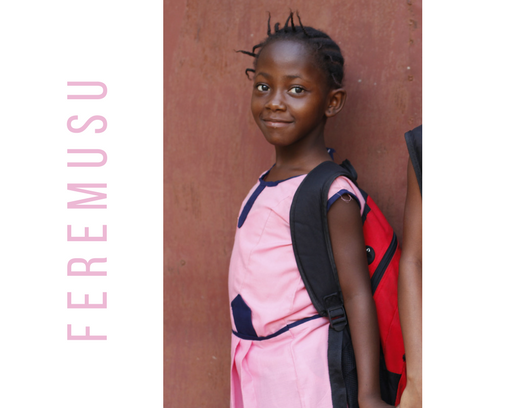
Feremusu
In 2013, a tragic epidemic began to devastate West Africa. Symptoms would begin with a sudden influenza-like stage, characterized by fatigue, fever, headache and sore throat. This was often followed by vomiting, diarrhea, abdominal pain, shortness of breath, chest pain, along with swelling and confusion. Lastly internal and external bleeding would occur with most people slipping into a coma at the end of their life. In what can only be described as horrific, death would typically occur in just 6 to 16 days from the onset of the first symptom.
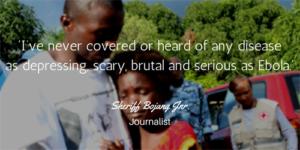 Journalist Sherriff Bojang Jr. shared these insights after covering the outbreak in Sierra Leone: “I’ve never covered or heard of any disease as depressing, scary brutal and serious as Ebola. This virus has rocked and affected every sector of the Sierra Leonean society. Lives were lost but livelihoods too were affected to the core. Everybody in the country has either been infected or affected.”
Journalist Sherriff Bojang Jr. shared these insights after covering the outbreak in Sierra Leone: “I’ve never covered or heard of any disease as depressing, scary brutal and serious as Ebola. This virus has rocked and affected every sector of the Sierra Leonean society. Lives were lost but livelihoods too were affected to the core. Everybody in the country has either been infected or affected.”
By the time that the Ebola outbreak had finally been contained in January 2016, there had been 28,616 reported cases and 11,310 deaths.
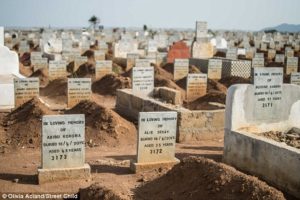 It was during this devastating public health emergency that Feremusu, was fighting to survive. When Feremusu was just 5 years of age, her mother was stricken with the Ebola virus. Feremusu, even now, can still vividly recall her mother’s final moments. “My mother held my hand and said to me, ‘Feremusu, I am dying.’ I cried. I was sad.” Her father, who was the chief of her village, succumbed shortly thereafter to Ebola as well. Young Feremusu was sent to live with her grandmother. With this highly contagious virus relentlessly snatching lives, Feremusu’s grandmother also fell victim to this vicious virus. With no family left to care for her, an elderly woman living on a farm had compassion on Feremusu and took her in. The plight of this now “double orphan” was about to take yet another heartbreaking turn when the older woman was bitten by a snake and developed a severe leg ulcer, rendering her incapable of caring for Feremusu any longer.
It was during this devastating public health emergency that Feremusu, was fighting to survive. When Feremusu was just 5 years of age, her mother was stricken with the Ebola virus. Feremusu, even now, can still vividly recall her mother’s final moments. “My mother held my hand and said to me, ‘Feremusu, I am dying.’ I cried. I was sad.” Her father, who was the chief of her village, succumbed shortly thereafter to Ebola as well. Young Feremusu was sent to live with her grandmother. With this highly contagious virus relentlessly snatching lives, Feremusu’s grandmother also fell victim to this vicious virus. With no family left to care for her, an elderly woman living on a farm had compassion on Feremusu and took her in. The plight of this now “double orphan” was about to take yet another heartbreaking turn when the older woman was bitten by a snake and developed a severe leg ulcer, rendering her incapable of caring for Feremusu any longer.
Nine months ago, the government realized that time was running out for Feremusu with no one left to look after her and requested that Mamaland Children’s Village take her in. Jamie Harwell, who was in Sierra Leone at the time, played a special role in Feremusu’s transition to Mamaland. Jamie describes the orphan as understandably very quiet, cautious and withdrawn when she first came, not allowing anyone to touch her. Jamie elaborated, “Feremusu was hardened. You could tell she had been through so much in her life, just by looking at her. Super independent. It was like the light was gone from her eyes. Even with such great sadness, she was incredibly beautiful. I cried when I first saw her. She was just so beautiful!”
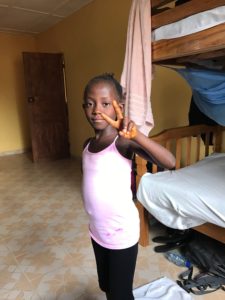
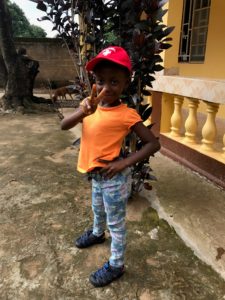
Dorcas, the grandmother who lovingly cares for the girls is thrilled with how Feremusu is now flourishing. She explains further, “The girl who would not allow anyone to touch her, now is very affectionate, giving and receiving lots of hugs, wanting to lay her head on my shoulder. She was scared to come close to us but now wants to jump all over us! In the beginning, she would never look at anyone straight in the eyes, but now she wants everyone to gather around her so that she can tell us stories. Feremusu works very hard in school and now speaks 3 languages. She is a very fast runner and came in second place in the 100-meter run at school. She is very kind and helpful to the other kids. She is a natural-born leader who prefers to be the one in charge. She is working on being a better listener. Each girl has a different chore based on their age. Feremusu does her chore, which is wiping down the bedroom floors, very well. Each week when her chore is done well and on time, I give her 1000 Leones, which is equivalent to about 13 cents. I am trying to teach the girls responsibility, how to do a job properly and the concept of earning a wage.” Feremusu is very proud of her work and has been saving up her money each month, keeping her coins in a special place in her room.
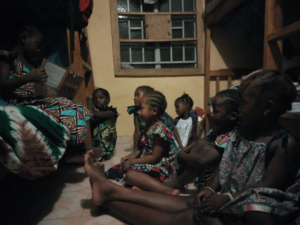
When asked what is the one word that Feremusu would use to describe how she feels now that she is in Mamaland, the now 6-year-old emphatically declares: “Happy!” Here Feremusu is reading a bedtime story to her “sisters” at Mamaland. In Feremusu’s own words, “I am so happy to have someone to take care of me! I go to school. I am in class 1. I like to learn. I have friends. My teacher’s name is Mrs. Conteh. I like food, most of all bananas, mangoes and pineapples. I like to have plenty to eat and to have my hair braided. When I grow up I want to help other people. I want to be a teacher. My favorite Bible story is when Jesus was born. I like that when he was born the angels danced!” When asked about what is her favorite thing about her new life, she quietly replied, “that I am not being flogged anymore.”
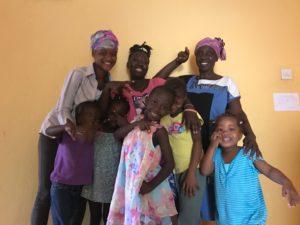
Tragically the Ebola virus dealt a devastating blow to so many in Western Africa. The immense loss of life has been unfathomable. While so many young ones were not as fortunate as Feremusu, despite the loss of her mother, father and grandmother, Feremusu has beat the odds. Today, as a beautiful, affectionate and motivated little girl, Feremusu (pictured in the middle), radiates the essence of survival as the world looks on with hopeful expectation for a better season ahead for Salone.



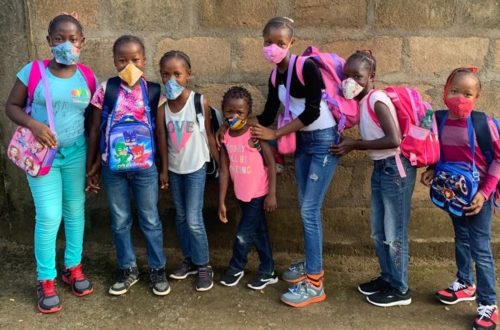
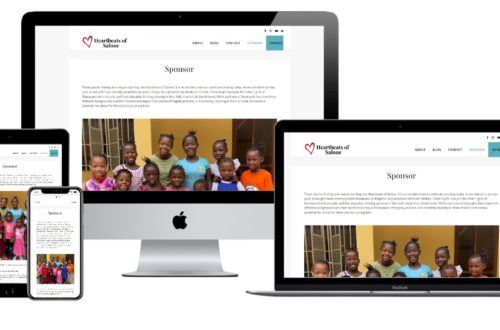
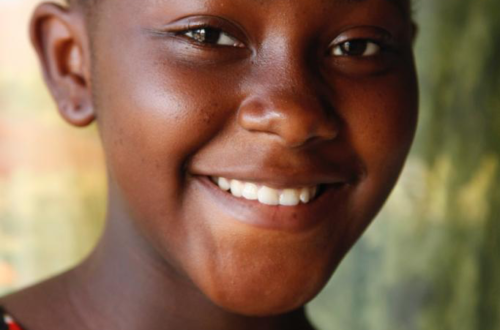
One Comment
Hope Law
Great Story about Feremusu! Thanks for bring the beauty that came out of a Tragic Time for SierraLeone.